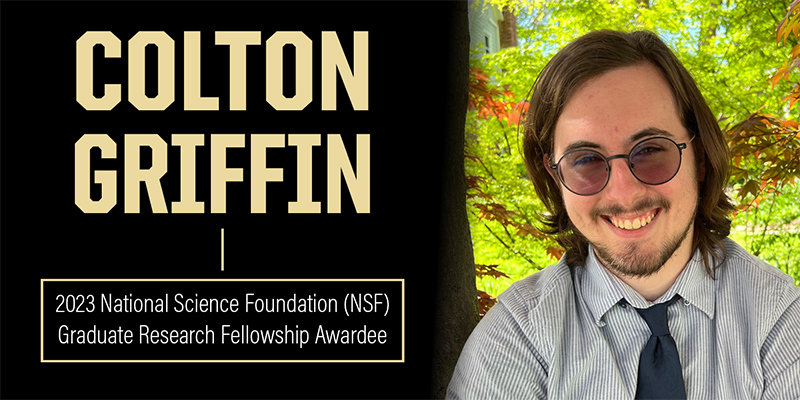Love of math, physics and unsolved Property F research lands Colton Griffin an NSF Graduate Research Fellowship
2014-02-21
 One particular conjecture has puzzled Purdue University senior Colton Griffin. In the field of topological quantum computing, there is a conjecture called the Property F. A desire to solve this problem has landed Griffin, who is majoring in Mathematics Honors and Physics Honors, a highly competitive National Science Foundation (NSF) Graduate Research Fellowship (GRFP).
One particular conjecture has puzzled Purdue University senior Colton Griffin. In the field of topological quantum computing, there is a conjecture called the Property F. A desire to solve this problem has landed Griffin, who is majoring in Mathematics Honors and Physics Honors, a highly competitive National Science Foundation (NSF) Graduate Research Fellowship (GRFP).
Griffin, who is the president of the Society of Physics Students at Purdue, received an email from the NSF letting him know he had been awarded the fellowship. According to the NSF, the program supports fellowships for outstanding graduate students who are pursuing full-time, research-based masters and doctoral degrees in science, technology, engineering or math or STEM education. The fellowship provides three years of support over a five-year fellowship period to help with the costs of education. The application process requires students to explain research they would like to pursue.
“Essentially, you write a grant proposal for your research as a graduate student, writing about what you plan to study and hope to explore or solve,” says Griffin. “For my application I wrote about a particular conjecture within the field of topological quantum computing called the Property F conjecture, which was originally proposed by Eric Rowell at Texas A&M. I wrote in my proposal that I would work with Prof. Rowell to further explore this problem and hopefully solve it. I also had to write a personal statement focusing on my research experiences, one of which was related to my proposal.”
Property F is a puzzle that Griffin would very much like to solve. Although he has not currently conducted research in this area, he is excited at the prospect of getting to study the conjecture.
“While I haven’t had any research on Property F, I have worked with Professor Shawn Cui from the math department in quantum computing. We looked at a particular class of sequences of quantum gates that display very nice properties. To give an analogy, imagine a rotation in 3D space about some axis that you pick. We proposed a sequence that would effectively compose rotations together in a way that does not depend on the initial rotation and converges to a rotation about the z-axis after some number of iterations of the sequence. This is a very useful sequence for topological quantum computing and general quantum computing due to how easy it is to implement, only requiring one quantum gate.”
Griffin will attend the University of Pennsylvania for a Mathematics PhD, and intends to study algebraic geometry and mathematical physics. As of now, he believes his research will likely heavily relate to string theory.
“This award is very exciting news since it means I can rest easy about my funding in graduate school,” says Griffin. “Additionally, I was really concerned I wouldn't get the grant because my research is very niche and very abstract. I tried to outline many of the possible applications of the Property F conjecture and topological quantum computing, and I think in general it's important for the GRFP to discuss what implications your work has outside of your own bubble of academic interest. Just because your work is specialized doesn't mean it won't have an impact on society!”
Future graduate students who might be interested in obtaining an NSF GRFP can learn about the application process here.
About the Department of Physics and Astronomy at Purdue University
Purdue Department of Physics and Astronomy has a rich and long history dating back to 1904. Our faculty and students are exploring nature at all length scales, from the subatomic to the macroscopic and everything in between. With an excellent and diverse community of faculty, postdocs, and students who are pushing new scientific frontiers, we offer a dynamic learning environment, an inclusive research community, and an engaging network of scholars.
Physics and Astronomy is one of the seven departments within the Purdue University College of Science. World-class research is performed in astrophysics, atomic and molecular optics, accelerator mass spectrometry, biophysics, condensed matter physics, quantum information science, particle and nuclear physics. Our state-of-the-art facilities are in the Physics Building, but our researchers also engage in interdisciplinary work at Discovery Park District at Purdue, particularly the Birck Nanotechnology Center and the Bindley Bioscience Center. We also participate in global research including at the Large Hadron Collider at CERN, Argonne National Laboratory, Brookhaven National Laboratory, Fermilab, the Stanford Linear Accelerator, the James Webb Space Telescope, and several observatories around the world.
Written by Cheryl Pierce, Communications Specialist
Photo provided by Colton Griffin